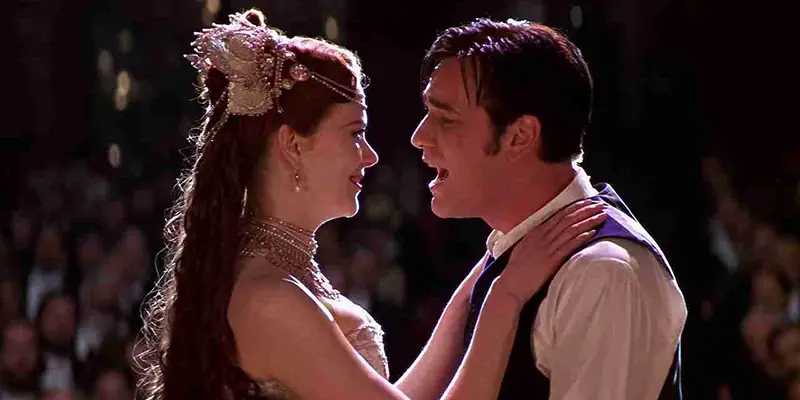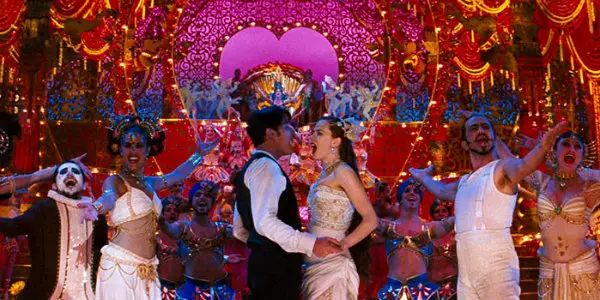Why People Love To Hate MOULIN ROUGE!

Alex has an unhealthy obsession with classic films.
There’s a warm feeling that engulfs you when viewing an old Hollywood musical.
Usually, it’s a wave of nostalgia as soon as the opening credits start to roll. When silver screen icons like Gene Kelly, Cyd Charisse, Ginger Rogers or Fred Astaire show up on your screen to entertain the masses for a few hours, you’re guaranteed an entertaining, yet competent, movie experience. Films like Singin’ in the Rain, Silk Stockings, and High Society are just a small sample of the many musicals that came from the Hollywood movie machine, with the majority being successful with critics and moviegoers.
So, when critics dubbed Baz Luhrmann’s 2001 film spectacle Moulin Rouge! as the “return of the cinematic musical,” I dismissed the claim, chalking it up as nothing more than movie critic hyperbole. However, as I revisited the film a few weeks ago, the claim of “cinematic excellence” that some critics were swift to bestow upon this film still seemed a little too eager.
The Origins Of Film Critic Vitriol
When Moulin Rouge! was released into theaters fifteen years ago, it was (for the most part) met with positive reviews. But, doing some digging on the film led me – surprisingly – to a vocal group of movie critics and fans who wouldn’t want it to be seen by their worst enemy. Complaints ranged from plot holes, to lack of depth, and even the film’s inability to find a consistent tone.

If you were to a take glance at the movie’s Rotten Tomatoes page, it’ll show just how divided most critics are about a film that was supposed to bring us back to the “golden age of musicals.” Some critics went as far to say that the film was akin to watching, “a hyperactive kid on a sugar high.”
The criticism the film receives is a little unfair, but it’s justified. It has its fair share of breathtaking moments, but fails to capitalize on many other interesting (and more compelling) plot points. Some of the things that happen in the film are just so outlandish that it isn’t difficult to see why the movie gets so much grief.
Headache Inducing Editing
One of the many grievances I hear when it comes to this film is its manic editing style. Baz Luhrmann is notoriously known for using a quick succession of cuts to exaggerate a particular mood in a scene (see: Romeo + Juliet) but, somehow, Moulin Rouge! managed to kick it into another dimension.
For those of you who aren’t familiar with this movie, the plot revolves a homely writer named Christian, played by Ewan McGregor, and his quest to seek ‘true love’ in early 20th century France. He moves into the Monmartre district of Paris, where he encounters a group of troupe performers led by a man named Henri de Toulouse-Lautrec, played by a very small John Leguizamo.
Since Christian was desperately looking for a new writing gig, the troupe had no qualms about asking for his help on putting the final touches on their play, “Spectacular Spectacular,” with the hope of selling it to the owner of the Moulin Rouge, Harold Zidler (Jim Broadbent). They go to the cabaret to accomplish this task, only to stumble upon a massive dance party between the clients and the employees, much to the delight of the group of misfits.

The scene opens up with the camera wildly rushing into the entrance of the cabaret, with Christian being greeted by a chorus of girls performing an ill-advised mashup of “Lady Marmalade” and “Smells Like Teen Spirit.” In order to show that energy inside was indeed brimming with excitement, Luhrmann chooses to give audience members neck pain by jolting the camera from one person to the next, which (in theory) creates an unhinged atmosphere.
This technique isn’t only irritating, it makes it almost impossible for audiences to enjoy the impressive sets that were created for the movie. Luckily, the editing does slow down a bit in the latter half of the film so we can appreciate the work that went into recreating early 20th century Paris.
Questionable Character Choices
The next issue the film has isn’t a technical one, but the fault of the script. The typical old Hollywood musical follows the three act structure: there’s a beginning, middle and an end, with clear character motivations.
One of the biggest frustrations critics have with Moulin Rouge! is that the main characters tend to be completely void of rational thought. In no other plot point is that more apparent than the brief love affair between Christian and Satine, who’s played by Nicole Kidman.

Satine is tired of using her body for purely sexual purposes, so she begs the owner to transform the bordello into a respected theater where, hopefully, she can become a respected actress. The only problem is that they don’t have the funds to do so, despite having a sea of customers throw thousands of dollars at her each night. In order to fulfill this pipe dream, Satine must court a potential investor in the Duke of Monroth, played by Richard Roxburgh.
Christian gets smuggled into a backroom to pitch his play, “Spectacular, Spectacular,” to Satine. He’s soon mistaken for the Duke, and she doesn’t realize this until he abruptly sings about his sudden love for her in a three minute song. The pair gets caught in an ‘awkward’ position by the actual Duke, so they make up an excuse, claiming that they were going over lines from the play.
After shrugging off what appears to be clear romantic intentions between the two, the Duke agrees to invest; the only condition is that he gets to keep Satine for himself. Now, any person could deduce that running around like teenagers and kissing each other out in the open could harm any future investments, right? No, not for Satine and Christian.
They continue to carelessly sneak around, narrowly escaping the eyes of the Duke. His ignorance is finally quashed when a random backup dancer (who I don’t even think has a name) explains that the play is a metaphor between the two lovers and that they’ve been using rehearsal time as a secret rendezvous.
I think the biggest pet peeve critics have with this plot hole is that no sane person would take that risk of getting caught by the Duke, out of fear of losing the investment he promised. And to top it all off, you have a background character, who we barely see at all, reveal one of the most important plot points in the whole movie. These plot issues are, at times, unrealistic and it begs the question: if Moulin Rouge! was made in the 20th Century, would the plot be taken seriously?
Old Vs New
Hollywood has been suffering from “idea fatigue” for a while now. Audiences are now rejecting the same old rehashed ideas that are usually profitable but are critical failures. Moulin Rouge! isn’t only disliked for the reasons I stated above, but I believe there’s a serious case of ‘expectations vs reality’ discrepancy going on with most of this movie.
When it was released in 2001, the film was praised for its uniqueness and originality, only to receive backlash for being unoriginal later on. I think the problems arose when movie fans expected to see that old Hollywood charm return in a Baz Luhrmann feature, only to be disappointed with the result on screen.

Old Hollywood musicals were filled with an authenticity that made them believable, but with Moulin Rouge! there’s a bit of cynicism that comes along with watching it. From the rushed courtship between Satine and Christian, to a side character revealing one of the most intimate of details of the film – these things seem too far-fetched to be taken seriously. And with the abrupt tonal shifts that the movie makes, it’s hard to believe the sudden changes back to a lighter mood.
That’s where the classic musicals of yesteryear excelled at. Most of those films knew how to strike that delicate balance between light and heavy-handed. Moulin Rouge! constantly bombards viewers with its light and whimsical scenes, only to eventually slap you across the face with an overly melodramatic death scene. If the film managed to keep a consistent tone throughout, the claims of “the return of the cinematic musical” wouldn’t be faced with such negativity.
In the end, Moulin Rouge! should be appreciated for what it is: a re-imagining of a genre we’ve seen for years. Yes, some of the plot lines are ‘inconceivable‘ and it can take itself too seriously, but if you sit back and enjoy it for what it is, you’ll find an upside.
Do you think Moulin Rouge! brought back the movie musical? Let me know in the comments!
Does content like this matter to you?
Become a Member and support film journalism. Unlock access to all of Film Inquiry`s great articles. Join a community of like-minded readers who are passionate about cinema - get access to our private members Network, give back to independent filmmakers, and more.
Alex has an unhealthy obsession with classic films.











